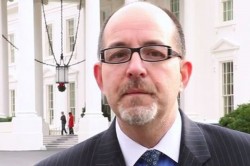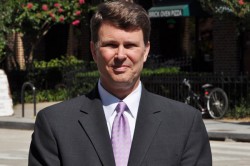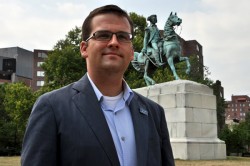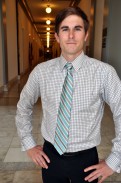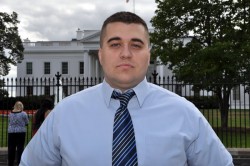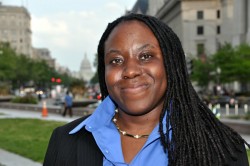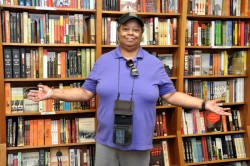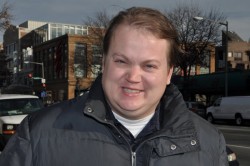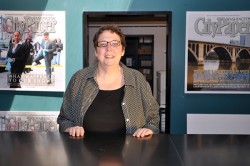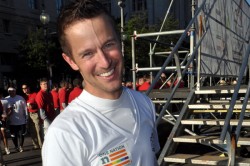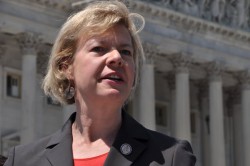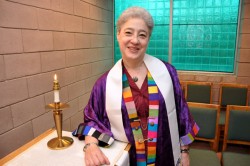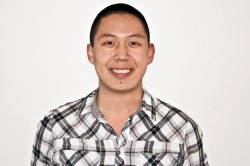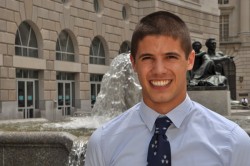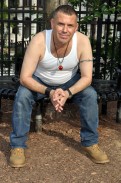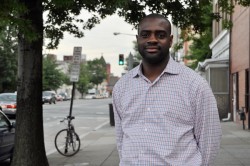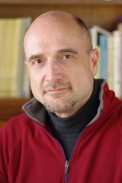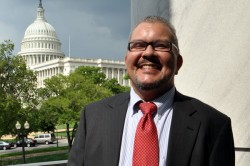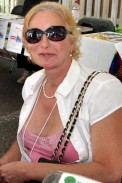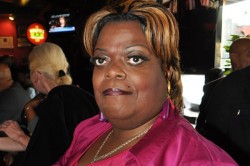Miscellaneous
Newsmakers tell their coming out stories
What’s the ultimate act of Pride? Coming out, of course. D.C.’s movers and shakers share how they left the closet behind
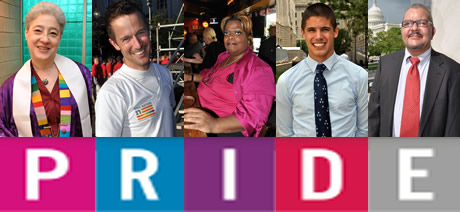
Brian Bond, 49
Deputy director, White House Office of Public Engagement
“Coming out” for me was extremely hard, and honestly terrifying, as I know it has been for so many of us. I knew by the time I was about 12 that I was “different.” Growing up in rural Missouri, I had no gay role models and only derogatory stereotypes to contend with. I knew no one like me. I, like so many, felt alone and isolated. To be honest, I prayed for a solution. Suicide was an option for me. With no one to talk to, I feared losing my soul, my family and my friends. I would sneak around at the library to find books to help me address my fears (yes, there were days before the Internet). But I could not find any answers.
When I finally had the courage to utter the words out load, it was to my priest during a face-to-face confession at 16. I was blessed by that interaction and will always be grateful to him. He told me that I wasn’t going to hell. He also told me I may want to move somewhere else to be happy after I got out of school. I was relieved, yet sad that for me to be happy I would have to leave my family. But he was right. Fast forward to last week. I helped advance the president’s trip to Joplin, Missouri. I spent my youth in and out of that town, sharing wonderful times with my grandparents, working to buy my first car, going to movies at the mall, just trying to fit in. There are many tragedies from that devastating tornado, the loss of life and homes, but something caught my attention in the news. The MCC Church in Joplin, the Spirit of Christ, had been destroyed. I could not believe that there had been an MCC church in Joplin. I was filled with a sense of awe. My first thought was that now there is a sanctuary for people to go and feel safe. I also know that there is a vibrant community full of pride. I hope as we go through Pride month we remember that church and that it is back on its feet soon.
For some of us, we don’t just come out once, but twice. For me, by the time I was in my 20s, I was out to everyone and life was good. Ten years ago, I had to “come out” all over again when I found out I was HIV positive. This month marks the 30th year since the HIV/AIDS pandemic began. My hope is that while we all celebrate Pride, we also use this time to recommit ourselves as a community to educating the next generation about HIV.
If my growing up in Missouri is any example, coming out isn’t always easy, but it is getting easier with each passing day. With a mobilized community in the fight against HIV/AIDS we can reduce that need for people to have to go through the pain of that “second coming out.” I hope we can use the 30th year of HIV/AIDS as an opportunity to educate and continue the fight against HIV/AIDS for the next generation.
Mitchell Gold
Owner, Mitchell Gold + Bob Williams
Founder, Faith in America
After many painful, horrifying, crisis-ridden years, I came out to my mother when I was 24 years old and my father when I was 26.
I have a good amount of opportunity to address parents of LGBT children. Here’s the most important thing I tell them: Every word counts. Every facial expression counts. When a human being decides to have children they have an obligation to learn about sexual orientation and gender identity so they can bring their child up in a healthy environment. A sound knowledge can also be an important part of teaching their children not to bully others.
My mother called one Sunday morning when I was 24 around 11 a.m. She woke me after a night of partying with my first boyfriend. A little sleepy, I told her I was going on vacation the following weekend so I wouldn’t be home for the weekly call. “Where and with who?”
“Going to St. Thomas with Michael,” I replied.
“Michael? Why don’t you have a nice girlfriend that you’re going with? Why are you always doing things with him!?” At that very moment I remember thinking “this is when I’m going to stop the lies.” She’ll be OK with it. My mother is smart, modern, warm, wonderful and fun. So I said, “Mom, my idea of a girlfriend is Michael. I’m gay.”
There was a short pause and in a nasty tone she blurted, “Don’t tell your father. He’ll have a stroke. It will kill him.” I was shocked and devastated. I don’t remember what I said to get off the phone but I did and we did not talk about it again for two years. When we finally did she told me she thought homosexuality was abnormal. Having just seen the opening of Torch Song Trilogy on Broadway, and having gained enormous personal strength through Michael and my family of friends in NYC, I said to her, “Mom, don’t you ever call me abnormal again. If you want to say my sexual orientation is unnatural to you, I can accept that and just say to you that heterosexuality is unnatural to me. Apologize or it will be a long time before we talk again.” Begrudgingly she did, but for years it created a wall between us because for me it was one of the most demoralizing things anyone had ever said to me.
At that same time I came out to my father. We were on the phone and he said, “Mitchell, all I care about is that you are happy and healthy. I love you. There’s not much more to say.”
Even today as I write this I get chills. Never have so few words meant so much to me. They gave me huge confidence that I think was one of the real launching times for me to flourish as a human being and in my career.
Surely I’m not perfect about this, but I do try and make every word count that I say to anyone.
John Berry, 52
Director, U.S. Office of Personnel Management
I knew I was gay pretty early on; my first crush was Aquaman. But coming out took some time, as I wrestled with faith and career concerns. I didn’t do it until the age of 25, when I started dating the man who would become my first partner.
Most of my family was supportive, but I knew my father would be challenging. He didn’t take it well. Sometimes — when you come out — the image a parent has of you dies, and they need time to grieve. We gave him space and time and, luckily, the rest of my family helped him along.
We’d eat dinner every Sunday night as a family, and at first, he said, “don’t bring your friend.” So my supportive family members would innocently slip tidbits into the conversation, like, “Tom is so great,” or “Tom helped us move.”
One night, my dad acquiesced. He pulled me aside and said, “Why don’t you invite Tom to dinner next week?” Gradually, he welcomed my partner into the family, and bonded with him. Nearly 10 years later, the night before Tom died of AIDS, my dad held him in his arms, weeping over the loss of his son-in-love, if not in law.
My dad was able to change and grow, to learn that the accepted homophobia of his youth was wrong. That to me is the core of the American character.
There will always be people we care about who have difficulty accepting who we are, but I believe in the power of love to overcome all. It starts with loving yourself. It grows into openness about who you are. For me, and for ever-increasing numbers of Americans, it ends with the acceptance and love of the people who matter to you most.
To be your best, you must be true to yourself. There are millions of Americans who have come out and thrived — in business, in government, in the arts, in every field of human endeavor. Our community and country are counting on you. No pressure — but we need you. You are worth it!
Christian Berle, 30
Deputy executive director, National Log Cabin Republicans
I grew up in Portland, Maine with two rather socially progressive, though fiscally conservative, parents; my mother had been a feminist, working on Sen. Eugene McCarthy’s 1968 presidential campaign, and my father was a leader in numerous environmental causes. Further, I went to the most liberal preparatory school in the state. In hindsight, I really didn’t have an excuse not to come out in high school, and doing so probably would have been easy.
The complicating factor (which I hope my work and the leadership of so many will prevent from being so for others) is that I always knew I was a Republican. I knew and chose to be a Republican even before I had the slightest inkling that I was gay. I remember meeting George Bush as he ran for president in 1988. I didn’t see a career for myself in elective office, but I knew I wanted to be involved in the GOP, and being gay didn’t seem to fit that. I didn’t see many out role models whom I could identify with. I remember seeing stories about Jim Kolbe coming out in 1996, but the press seemed to report that he was the black sheep of the GOP, and being out of D.C., I never heard about him until much later (I think it might have been meeting him personally).
When I finally came out, I was a rising senior at George Washington University and very involved in College Republicans and student government, I even remember being branded as the “Karl Rove of GW politics” (I think the author saw that as more offensive than some of my fellow College Republicans). I was able to come out under my own terms, by telling my family, fraternity brothers, and friends individually. In each case it was a non-event.
However, I never felt comfortable in my “gay skin” until 2008, when I became involved in the D.C. Log Cabin Republicans, finding a strong set of friends whom I could identify with and held many of the same positions in political life. Subsequently, I joined the LCR staff and found myself in the position of being a gay lobbyist (and semi activist). Wearing an LCR lapel pin and being quoted in the Blade or the Post never gave me cause to explain that I was gay and never created any push back even in the most conservative of circles.
This gave me opportunities to work with some truly amazing people and for some great causes including the repeal of the failed and unconstitutional “Don’t Ask, Don’t Tell” policy, lobbying extensively for a fully inclusive ENDA, campaigning for marriage equality in Maine, being on the Victory Fund Campaign Board, all while serving on the D.C. Republican Committee. I hope that those growing up can find themselves in the place where I’ve ended up without such a long wait in the wilderness.
Chris Fisher, 26
Legislative assistant to Rep. Ted Deutch (D-Fla.) and manager of Pink Hill Mafia Listserv
My Grandpa is a headstrong Iowan who spent 64 years married to the girl he fell in love with after only one church social. He spent World War II delivering American-made care packages to Hitler’s forces in a B-17. He still teaches his grandchildren and great grandchildren that 12 times a day is not too many to tell your wife you love her. My entire life, he made me feel that he could not be prouder of me, even though I am a Democrat. Having the faith of a man like that makes me want to try harder, do better, and do more good. He raised me like a son, and I am the only one of his dozen grandchildren who shares his last name.
With uncharacteristically little fanfare, I was fully out after high school — conservative small town behind me and college ahead. I have lived openly and without fear. Family gossip, my LGBT activism, and Facebook sent this unequivocal message to everyone but my grandparents. I did not tell them because I was worried they would not be proud of me anymore. Even though I always asked about Grandpa’s “aunties,” Ethel and Jamie, and even though Donna Shalala introduced me to the University of Miami class of 2007 as an activist for the homosexual community, the message never got through. Or maybe it did, and we just were not going to talk about it. Either way, if I wanted him to know about this wonderful thing, I would have to have the conversation directly.
I recently found the type of love he taught me to look for, so I took Grandpa to dinner to tell him. We were having a lovely time with rich conversation and mediocre Chinese food. On the drive home, I told him I always admired the love he and Grandma shared and held it as a golden standard. I told him that I found a person who makes me feel like that. He was happy to hear about her. Then I corrected his pronouns. His initial confusion turned to concern that I wouldn’t get as far in life or people would treat me poorly. I assured him that times were changing but left wondering if his feelings for me would change.
Four months later, Grandpa drove to meet my boyfriend and keep us company during a layover at the airport near his house. He’s still proud of me.
Someday, this remarkable story will be less so. When the changing tide touches every heart in every small town across this land, the American family will once again embrace a people it previously rejected. In this near future, questioning youth and dedicated service members and closeted politicians will have a smoother path than the generation before. Just as I did. Until that time, come out. Wherever you are. Ideas are much easier to hate than people. Your courage brings us one step closer to that radical agenda the far right warns about: equal opportunity and equal justice.
Alex Nicholson, 29
Executive director, Servicemembers United
Coming out to myself and others came in several stages, sometimes intentional and at other times unintentional. I came out to myself and came to terms with my own sexual orientation in my early teens. Although my Southern small-town upbringing and my parents’ conservative Southern Baptist household made that process a little rough in the beginning, the wider social and information network I found online at the time really helped me avoid having to go through a longer and more painful process despite my relative isolation in the rural South.
Following in my father’s footsteps and joining the Army at 19, however, forced me back into the closet. That door was pried open unintentionally a year later, which resulted in my untimely discharge under “Don’t Ask, Don’t Tell.” While my mother already knew I was gay at the time, my father, whose name I share, did not. I unintentionally came out to him when the Army mailed part of my discharge paperwork to my home of record address — my parents’ address — and he mistakenly opened the envelope, thinking something coming from the Army to their home must be for him. Imagine his surprise!
Now, working and socializing in the defense and military community, I often still have to come out again and again. While I’m certainly comfortable in my own skin, others do not always realize I’m gay when they first meet me. I can’t tell you how many times the typical D.C. question, “So what do you do?” has led to my “coming out” again and again.
“I run the non-profit organization Servicemembers United,” I always respond. Given the inherent discreetness of the organization’s name, most in the defense community never assume it’s an LGBT organization. The ones who inquire further, however, are usually surprised when they hear our tag line — “We’re the nation’s largest organization of gay and lesbian troops and vets, and of course their partners and families.” And with that, a smile usually concludes yet another coming out experience for this unlikely activist.
Lateefah Williams, 34
President, Gertrude Stein Democratic Club
A large amount of my coming out story focuses on my journey to finally accepting my sexuality because the hardest person for me to come out to was myself. I had my first crush on a woman while I was in high school. I did not think much of it at the time, as I just assumed that this woman intrigued me for some reason. Rather, I decided to focus on my schoolwork, college plans and the occasional date with a guy. In college, my attraction for women did not go away. Instead, it intensified. I was also facing the internal dilemma of my Christian upbringing. Even though no one in my family or church specifically told me it was wrong to be gay, I had gotten the message from society or the media that Christianity and homosexuality were not compatible. Thus, I did everything possible to ignore my attraction to women.
Rather than address my same-sex attraction, I focused extensively on my academic work and on extra-curricular. I continued to occasionally date men, but I did not date any particular man for an extended period of time. Rather, for the most part, I did not date much. Believe it or not, the void was not that big at the time, because my time was accounted for and I was surrounded by friends and classmates all the time. I did, however, go out with some gay classmates to my first gay club while in college.
After college, I went straight to law school. So, once again I had the ability to divert my attention from dating and to focus on schoolwork and friendships with classmates. Around this time, I was starting to come to terms with my sexuality, but I still didn’t feel comfortable enough to tell anyone and I still had not been on a date with another woman. I attended one or two OutLaw meetings (a law school LGBT organization) during my last year of school and I was so nervous that someone would see me entering the meeting that I walked by the door several times, while making sure none of my friends saw me, before deciding to go in.
I graduated from law school at 24 and I was 25 when I finally decided that it was time for me to really explore my same-sex attraction. Without schoolwork, school-related activities, and the constant access to peers that academia provided, I felt the void of not dating for the first time. I finally started going out and placing myself in gay and lesbian environments. I started by going to Black Lesbian Support Group meetings and D.C. Black Pride functions. During this time I began to date women and, in the process, finally came out to myself.
My journey coming out to others is one that continues to this day. I’m a naturally reserved person, so while I verbally told some people, there are many others (the majority) who I was sure knew that I was a lesbian, as I stopped trying to conceal it, so I didn’t think it was necessary to tell them. In hindsight, I would probably handle that a bit differently. My mother asked me if I was gay when I was 30 and I told her yes. I had been trying to drop her hints for some time and I was relieved when she asked me because I wanted to tell her, but couldn’t find the courage to initiate the conversation. She then told my father. Thus, in many ways my coming out to my parents was probably easier than most people’s experience and they have never said anything negative to me.
My political coming out occurred in 2009. My friend Desi Deschaine facilitated me joining the (unofficial) LGBT Caucus of the D.C. Democratic State Committee and beginning the process of being out in political circles, after I came out to him during a Young Democrats of America conference. At the time, we were the national committeewoman and national committeeman for the D.C. Young Democrats. Desi passed away in the summer of 2009 and at the Gertrude Stein Democratic Club’s annual awards later that year, I recounted how he helped me begin the transition from being a Democratic activist to being an LGBT Democratic activist and fully representing myself in Democratic circles. To some people from the D.C. Democratic Party who attended the event, that was my coming out speech.
My next significant coming out happened a few weeks ago when the Washington Blade featured me in its Queery question-and-answer segment. Even though I definitely already considered myself out of the closet at this point, it still revealed my sexuality to many people who did not previously know, not among those who read the Blade and found their way to the Queery on their own, but to those who saw the Queery because I posted it on my Facebook page. I am Facebook friends with many people who I have met over the years and some of them I have not seen in 10 or 20 years. Thus, this was an entire network of people for whom the Queery opened their eyes in ways that even the Stein presidency had not.
I believe coming out will always be a continuous process because we live in a society where heterosexuality is considered the norm. Thus, with every encounter, there is always a decision to be made about whether to explicitly reveal my sexuality. I plan to continue my journey of living an honest, open, and authentic life.
Deb Morris
Politics & Prose
I was a lesbian long before I came out. Let me clarify that, back in the 60’s, when I was in college and in the years afterwards, it was more important for folks to not find out. The closet was your friend. I had friends in Manhattan who took different trains to work so no one would know they were living together. So in those years, there was no pressure to come out. Outside my circle of college friends, there were only two people who knew — a high school friend who dropped me when she found out and my brother who told me I was lying. It’s not the kind of thing you lie about.
In the interim, I had a girlfriend and lost her, moved out of the family home and found a job at the phone company. I became active in various groups and marched against the war in Vietnam, and later against our incursions in Central America, found my way to Lammas, went to feminist consciousness-raising groups, processed a lot, served on the board of the Feminist Credit Union and joined the Sophie’s Parlor Media Collective and began doing radio at WPFW. So much of the discussion at those processing consciousness-raising groups was about coming out. I remember attending some of the meetings and feeling that women were being pressured to come out whether they were decided or not.
I like to say I came out on the radio. I was out at a club one night, I began talking with a woman who was part of a black lesbian social group that was having events in the community. I swear that some weeks ago, before I was asked to write this, I was thinking about them and remembered their name, but it has gone back into the memory vault. So I invited her to come on the show. I was still learning radio and I made my share of gaffes and mistakes on the air, but this night I think I acquitted myself well. I wanted the message that there were black lesbians out there making a substantial contribution to the community and I think they were pleased to be a part of the program. What was more important, I wanted the audience to know that I was part of that community, so the interview was conducted with that in mind. I was the dyke on the mic.
Christopher Dyer, 41
Former D.C. GLBT Affairs director; occasionally appears as Cookie Buffet
My coming out date is August 17, 1993. Like many, my coming out was a process and not an event. In retrospect, I was aware of my attraction to other boys at a very early age. I didn’t feel any conscious shame about these feelings but just assumed that they would eventually go away because I wanted to have children and just assumed that I would meet a nice woman, get married and have kids. With the onset of puberty, it became clear that this attraction to men thing simply wasn’t going away but as a good Catholic altar boy, I clung to the belief that I would meet the right person. I even attempted to date a few girls but nothing really clicked. In high school, I discovered the joy of alcohol and began getting hammered on a regular basis but just assumed that my consumption was normal.
In my junior year of college things began to get a little clearer. After briefly attempting to date another woman, my higher power intervened as I was going to visit a friend and stumbled across an outreach event by the local LGBT student group. One of the speakers was bisexual and I immediately identified with what he was saying and I came out two weeks later as bisexual. I did homophobia education as a bisexual and still clung to the notion that I really wanted children so eventually I would meet a nice girl.
After graduation, fate intervened once again in the form of a very colorful conversation with a former co-worker that made me realize that I could marry a partner and adopt. I avoided the LGBT community and convinced myself that I would meet my future partner at a bar and we would spend the rest of our time watching football and drinking. Can we say internalized homophobia? My alcoholism was also getting worse and by the grace of my higher power, I decided to give sobriety a chance and life got incredibly better. They say that the same man will drink again so part of my recovery included coming out to the gay community.
One of the foundations of recovery is service and I got increasingly involved in organizing in the community and had a quaint notion that doing drag would be a lot of fun. I have a ridiculous number of friends and am part of a strong community that loves me. The irony that I had to stop drinking to come out is not lost on me but I’ve always had to do things a bit differently. Coming out to family and friends was reasonably smoother than anticipated and I am blessed to have a fabulous relationship with my mother and father. My sobriety day is also my coming out day and I have a lot to be proud of. As Frank Kameny says, gay is good.
John Klenert, 61
Board member, Victory Fund Campaign
Member of ‘DC 41,’ arrested while protesting for D.C. voting rights
How many times have we been urged by Glinda to come out, come out wherever we are? Every time I saw her arrive in Munchkin land, I too always wanted to arrive in one giant bubble, wave my wand and get the coming out business over with in one giant, grand act. What happened? Coming out has taken on a lifetime saga with more scenes and acts than A Midsummer Night’s Dream.
First, thanks definitely go to D.C. Comics, when in my early youth I realized that my attraction to the likes of Superman, Flash and Aquaman was beyond just costumes (and yes, I was also jealous that Robin lived in a mansion with its own playroom in the Batcave).
By high school, now fully loaded like City Council Chairman Brown’s SUV with lots of experiences, I knew the traditional wife and kids role would not be mine. Taking the “Don’t Ask, Don’t Tell” approach, I went into seminary, certainly not believing in or seeking a “cure” but hoping for a monastic career. By my senior college year, I realized this life was short on happiness and left the robes behind and slowly began the official coming out, which began with one of my siblings whose husband had a brother who also was gay. From there, I told my mom, who asked if I wanted a doctor. I told her I felt perfectly healthy, then told the my siblings. Dad was told a few months before he passed away but thought it important for both of us to let him know the truth, which I assumed he knew but wanted to make sure.
Working at AT&T began certainly not putting out a voicemail broadcast but just assumed my fellow employees knew. However, after the March on Washington, I established a D.C. chapter of the LGBT employee group LEAGUE. I did come out in a big way at that point. I wrote an invitation to everyone in my building (about 1,000 people) to join LEAGUE. No going back at that point! Since then, I assume that everyone — whether they be from work or in church or extended family or organizational boards of directors — knows by living the words of Shakespeare’s Puck “Lord, what fools these mortals be!” if they cannot tell.
Amy Austin
Publisher, Washington City Paper
I come out at least once a week to my children. Not the way I did to my friends: They knew me as a late-blooming bisexual who fell head over heels in love with a woman in my late 20s. But it was motherhood, 15 years later, that taught me to self-identify as a lesbian when ambiguity didn’t suit me.
As a single woman, I adopted two extraordinary kids from Guatemala in the quagmire of international adoptions where it’s simpler to adopt from another country than your own. Then I found the woman of my dream; she had a child, too, and we became the “gaydy bunch,” with three young children. Kids’ understanding of identity is different. So we go over it — again and again and again.
Last week, my younger son called me a “Gay Blade” as a minor insult during some tickling time. I had to remind him he’s in a gay family and that my good friend Lynne Brown publishes the Gay Blade! In other words, he didn’t know what he was saying when he hurled the 40-year publication’s name at me.
Meanwhile, my other son has proclaimed he won’t wear my wife’ s shoes as they are too swishy. “Really,” I thought. “I’m the swishy one.”
As they grow up, our kids will be charged with how to understand their identities and the labels that get placed on our family. The world will find ways to remind them our family is not the norm. In the meantime, I’ll keep on coming out whenever the quirky questions of a child’s mind demand an answer. As parents knowing the biases we’ll face, that’s our job.
Peter Fox, 44
Musician, PeterFoxMusic.net
“Wow, what’s that like?” exclaimed my mom when I came out to her (and the rest of my family) in my early 20s.
Just the nature of her question to me describes their love for me and their trust that I am exactly who I am meant to be. I just don’t think my clan was genetically wired to feel as though I or they had done anything “wrong.”
My mom’s words ring out to me still as I continue to hear others’ painful or complicated stories of revelation. I think maybe they were better with my news than I was at the time, begging to meet whomever I was dating, but their affirmation of me — and not just a “we love you anyway” stance — really helped me move quickly past what was left of my own struggle with being different.
I knew something was up when I was about 7. Later, as a sophomore in high school, I met my first boyfriend. He and I shared all of the rest of our grade school years together as inseparable BFFs, and while we were more or less secretive about it, everyone who knew us then would surely look and back and say, “of course they were in love!”
Even though my true coming out happened a few years later, that wonderful emotional experience at such a young age helped me form a pretty solid basis of belief that I was OK and on the right track. To this day, my jobs, my music, my friendships, my relationships and my stance on many unrelated things are all informed by the supportive and loving experiences that were mine about being gay.
It definitely wasn’t always easy, that’s for sure, but most of my struggle was really only inside me, not directly placed upon me. As I look forward to enjoying another year of Pride celebrations, I am reminded that I am actually grateful to have had the fairly huge experience of struggling to fundamentally figure out who I was. That struggle taught me how to embrace all kinds of things that are hard to see or accept or understand, and move through my own learning and growth with an emotional and spiritual intelligence that I probably would not have otherwise ever found.
This month, it’s not so much that I am proud to be gay — inasmuch as I’m not exactly proud of my blue eyes — but rather that I am proud that gay people (myself included) have been strong and insistent and humble and patient as the rest of the world slowly catches up in their understanding that we are just who we are supposed to be.
Tammy Baldwin, 49
Member, U.S. House of Representatives (D-Wis.)
I came out to myself in 1983. I was a junior in college. It was a process of self-discovery, of self-definition.
When I came out, I searched for everything I could find to read that would give what I was going through some sort of social and historical context. I saw every movie (the few that there were). I think I watched “Before Stonewall” and “The Life & Times of Harvey Milk” at least a dozen times each.
I read about people like Elaine Noble, Harvey Milk, Del Martin and Phyllis Lyon, Frank Kameny, Morris Knight, and the Stonewall rioters; and it made me so proud to be a part of this group of honest and courageous women and men. But it also made me angry.
Angry because in all my years in one of the best public school systems in the country and at one of its finest colleges, no one had ever uttered the words gay or lesbian in a class.
No role model had ever told me about the Daughters of Bilitis, the Mattachine Society or Stonewall, or any of the brave leaders who shaped our movement or contributed their art, their science, their sweat and their intellect to this world.
I’d gone through a public school system (as most in my generation had) that ignored the contributions of gays and lesbians, a system that never tried to make our nation’s and the world’s history whole and truthful by including our part in shaping it.
So, as I came out, most troubling was the thought that in order to live my life and my dreams, I’d have to make a choice, a choice between pursuing a career in public service, perhaps running for office, and living my life in an open and honest way.
Many of us feel we face this choice. At the age of 24, I decided I didn’t have to make that choice, I could do both. I could run for office and I could be out. It was a terrifying thought, yet it ended up being one of the most freeing things I have ever done.
Rev. Bonnie J. Berger, 56
Interfaith minister
Is it possible to date a clarinet? If so, I definitely did throughout high school.
That was my dating life — hanging out with the kids in the band. I wasn’t attracted to the boys and in the early ’70s it just didn’t occur to me that girls were an option. My clarinet and I continued to date for my first two years of undergrad. Then I transferred to Kent State University in my junior year.
The first time I saw lesbians that I knew of, there were five of them doing a presentation in my dorm lobby on what it was like to be gay. Some of the women who lived in the dorm were hassling them — saying things like, “I don’t want to shower in the same area as you” and “You should have your own dorm” (maybe that would have been a good thing in some ways!). I stepped up and defended the lesbians.
Of course at that moment, I was immediately labeled one myself. But I wouldn’t embrace that notion for another two years. At that moment I was simply being an ally to folks who were being harassed and mistreated. And it did let me know that, yes, women were an option.
Similar to my journey to become an interfaith minister, I followed my heart, not the path that had been prescribed for me. That path would have had me become a nice Jewish heterosexual woman, married to a nice Jewish man, living in the nice suburbs of Cleveland. Instead, after an unfulfilling attempt at dating a guy, I acknowledged to myself in 1977 that it was women who fulfilled me in the ways my heart, spirit and body longed for. That realization brought me peace, relief and a wholeness that had been absent. It was that same peace I would find in 2005 when I “came out” in knowing that my path was to become an interfaith minister.
There were similar lessons in both of these realizations. I learned that when I am fully authentic and accepting of myself it is much easier to not take someone’s unfavorable comment or reaction personally.
I learned that being true to myself is not a choice but a necessity. And I learned that it is only from a place of wholeness that I can be of service to others. My life has unfolded keeping these truths in mind. In retrospect, perhaps there is one thing I might do differently — take up saxophone instead of clarinet. At least then I could be sure I was having safe sax! Blessings to all on their coming out journey.
Christina B. Hanhardt
Assistant professor, Department of American Studies
University of Maryland, College Park
In general, I do not “come out” but that doesn’t mean that I do what many people assume to be the opposite: hide in shame or present oneself as other than I am.
I teach in an LGBT studies program and I strive to craft classes that give students the tools to analyze both how ideas about “appropriate” gender or sexuality have been used to regulate many peoples’ lives and how an expansive mix of gender and sexual identities have given people a sense of community.
Sharing with my students these concepts is more important to me than revealing my own identity, because not all LGBT people share this commitment, a commitment that I think also helps us to understand the marginalization of people who don’t identify with those terms. That said, I also appreciate that for many of my students the fact that I am a masculine woman with insider knowledge of many LGBT and queer cultures is quite meaningful to them.
But I do know that this can all sound rather academic, so I’ll also share the story that made it clear to my friends and family about how I planned to live my life. The summer after I graduated from college, I packed a small suitcase, borrowed money to buy a one-way ticket to San Francisco, and checked into Sappho’s Boarding House for Women. Every day I took the bus to Valencia Street, tearing down signs for all-dyke households. Once I found a room, I wrote to my family asking them to mail me a trunk I had packed (yes, it is hard to believe that this was not the 19th century!), cut off my hair, bought my first men’s suit and continued living the life that would bring me to where I am today.
Tim Wong, 24
Design editor, Washington Business Journal
Coming out to my mother was probably one of the scariest and yet surprisingly hilarious experiences of my life. I was 22 and had been completely out to just about everyone in school and at every job I’ve had since I was 15 — I had been active since I was 13.
I was visiting my parents in Annapolis and was running errands with my mom and we started talking about my cousin who was getting married in a few weeks. This conversation quickly turned into a “Why haven’t you brought any girls around?” and an “Are you dating anyone?” interrogation and I was getting noticeably irritated and upset. I’m a bit of an emotional driver and probably should have pulled the car over — there’s got to be some bad Asian driver joke there somewhere — but instead I just kept driving and eventually spilled it.
“Mom, there aren’t going to be any girls around.” And then with a tinge of attitude and a healthy dose of tears running down my face I continued, “I date guys and it’s not just a phase.”
We were only in the car for a few minutes longer, but the mutual silence thereafter was deafening. When we stepped out of the car and started walking the first thing she said to me was, “You know it’s not good to lie to momma.” Realizing what a crappy son I had been, I ended up fessing up details about every boyfriend of mine that she had ever met under the guise of a tennis partner, friend coming over to play video games or study buddy.
The serious part of our conversation ended when we were waiting to check out at a store in the mall. Something provoked my mom to ask me if I did the girl or the boy part. Shocked, I froze, but I knew I had no right to keep lying to her. I replied saying, “Both.”
My mom’s eyes widened and she said, “Oh, I guess I asked for that one.” I laughed and gave her a big hug and a kiss on the cheek. She and I have been relatively solid ever since.
Anthony Cotton, 28
Investment officer, U.S. Agency for International Development
I joined the Peace Corps suspecting that I was gay, and with every intention of using my two years living in a small village in Ghana to come to terms with and accept my sexuality. Months of long silent nights spent wrestling with my truth resulted in the clarity I had sought — I swelled with pride when I finally came out to my fellow Peace Corps Volunteers.
In spite of my pride, my circumstances and fear limited my openness. Given that male homosexuality is illegal in Ghana, and that several people had warned me of the potential negative consequences of coming out, I decided to live a double life for the remainder of my service — I was open with Americans but closeted with Ghanaians. With time, though, this initially satisfying compromise became a burden, and I longed for the day I could live completely openly. Because I felt I couldn’t explicitly come out to Ghanaians, I took comfort in small moral victories, like engaging in generic conversations about LGBT rights and painting murals throughout the village featuring pink triangles and the Human Rights Campaign logo. Still, at the time I left the village I was sad that I had never shared my truth.
Today, several years after completing my service, I feel privileged to be able to live as an openly gay man in Washington, D.C. Whether running with the DC Front Runners, serving as policy director for Gays and Lesbians in Foreign Affairs Agencies, or organizing an event for LGBT Presidential Management Fellows, I find it fun and inspiring to be an active part of the LGBT community and to participate in the fight for LGBT equality. I like to think of myself as fully out, an LGBT activist even — with a rainbow flag in my office to prove it — but this is not entirely true. I return to Ghana at least once a year for work and, while there, I always take the opportunity to return to my Peace Corps village where my closet awaits, where I tell half-truths, and where I fear I will be rejected or even hurt if I reveal myself.
This humbles me and reminds me that even those of us who are out and proud in one circumstance might struggle with the closet in another. It also encourages me to support the fights for local and global LGBT equality – for those of us able to live openly without the constant fear of violence have the responsibility to interrupt anti-LGBT discrimination on all levels, and to fight for those silenced by their circumstances. Until we live in a world where it is safe and acceptable for everyone to live as his or her authentic self, even the “most out” person will not be fully free from the closet.
Jose Gutierrez
Founder, Latino GLBT History Project
I was born and raised in Mexico. We moved to Atlanta in the 1980s and I was really active organizing the Latino LGBT community. I came out in the ‘80s. I was participating in Atlanta Gay Pride and preparing my outfit for the parade. The outfit was fierce, with Latin feathers and glitter decorations with the rainbow colors. My mother asked me, “Where are you going with this outfit?” And I replied, “I’m going to the Gay Parade.” My mother did not understand the word “gay,” and I explained in Spanish what it means.
She was nice with me and she explained to me that she understood. The coming out (Saliendo de el closet) process was important in my life because it’s about understanding, acceptance, love, compassion and a sense of dignity and respect. I think “Saliendo de el closet” is a healthy process for the LGBT community. The benefits of coming out are really positive energy.
Jeffrey D. Richardson, 32
Director, D.C. Office of GLBT Affairs
For me, “Coming Out” means finding self-love and self-liberation. My journey to self-love and self-liberation as a black man who is gay and who was raised by two God-fearing, holy ghost stomping, hands laying Christian parents came through the love and support I have been blessed with from friends, colleagues, family and a very special soul who is no longer walking with us.
As a young person learning myself and exploring my identity, it became clear to me that the spiritual baggage I inherited as a youth, caused me to hide my complete self from the world. I wasn’t able to let anyone get too close. I was blocked from loving myself or experiencing love from others.
My breakthrough moment came with true unconditional love. As this love grew, so did my desire to continue the self-exploration that would lead to my self-liberation. As I learned to love me, I reached a place where I could no longer hide my identity as a gay man, forcing me to let go of the suffocating fear and anxiety I felt. Mentally and spiritually, I was dying. The only thing I could do was turn to my faith. Pushing aside the bigoted, false doctrine I was taught, I turned to the story of resurrection. I was reminded that through the power of telling my story, I could find self-love and be resurrected into self-liberation.
I had to let someone know what I was dealing with and that I couldn’t handle it alone. I needed them to know that I was in pain and it was killing me, slowly. I needed my family to know that while I loved them, I wasn’t willing to sacrifice me for their societal comfort or false doctrine. I was on the path to self-love and either they found the strength to stand with me on this journey, or I would walk the road alone.
So, I told my story and challenged my family to let go of their preconceived notions and ingrained philosophies and to see me as the person they’d always loved, as Jeffrey. It wasn’t easy, there was pain, hurt feelings and silent blame, but in the end they showed me that they could set aside their beliefs and love me, not the person they wanted me to be, but the person I am. Now, they aren’t marching in the Pride Parade, but they no longer ask me to sacrifice myself for their comfort or beliefs.
My road to liberation allowed me to begin sharing all of the special wackiness that is me with the world. And to my surprise, all of me was accepted, loved and very much wanted. As the journey continues, I know that I walk forward with a tribe of friends, family and allies by my side. I continually give honor to those who have and are walking before me, and I am consciously aware of those crawling behind me.
Luke Jensen
Director, Office of LGBT Equity
University of Maryland, College Park
Coming out is a life-long, dynamic process of realization and disclosure. People tend to understand this concept when applied to those who are in the initial phases of figuring out which label best suits them or which ones to reject.
I’m gay. That was settled long ago. But what being gay means to me and how it plays out in my life continues to be a dynamic process of realization and disclosure.
One example comes from the early and mid-1990s when I was co-chair of our Lesbian and Gay Staff and Faculty Association — a name that later came to include Bisexual and Transgender. We had been championing domestic partner benefits with some successes and many setbacks. One setback came in the summer of 1996 when, under pressure from senior state legislators, our Board of Regents voted down proposals for domestic partner benefits.
The groundbreaking of our Performing Arts Center was scheduled later that fall and the two state legislators who had most publicly opposed us were both scheduled to speak. We organized to protest their presence on campus. We did our homework, making sure to follow all rules for legal and orderly protest.
The campus president was not happy and the vice president for university relations summoned my co-chair and me to meet with him and one of his senior assistants. Their task was to talk us out of protesting.
So there we sat, a gay man and a lesbian across the table from another gay man and another lesbian. I have no idea if they knew we knew their sexual orientations. Neither were participants in the staff and faculty group. I am sure they both thought of themselves as out because their co-workers and supervisors knew.
During the course of the meeting, the senior assistant said, “They are just doing what politicians do, and you are just doing what activists do.” I laughed out loud. Activist? Me? No one had previously used that term to describe me, nor had I ever considered it to be part of who I am. I was simply standing up for what I believed.
We went ahead with our protest. The two politicians discovered scheduling conflicts (yeah, right) and cancelled, so we targeted the Regents themselves.
I became the director of LGBT Equity on campus and after two changes of administrations in Annapolis, we got the benefits.
The activist label stuck. It is a part of who I am and it is inextricably tied together with that other label, gay.
So for me, it is not just about being “out.” It is about standing up for yourself and for what you believe.
Diego Miguel Sanchez
Legislative assistant to Rep. Barney Frank (D-Mass.)
I was born female and transitioned to male. While becoming Diego on the outside took longer than to recognize it inside, disclosing to my parents at age five that I was “born wrong” still chokes me up.
I grew up in the Panama Canal Zone, where my friends and I rarely wore shirts. My friends were all were born male, and I didn’t perceive myself as different than they for years. We played with bugs and vegetation and spent much of our time in the jungle or at the beach.
As a child I loved nature until one day I realized that Mother Nature and I might need to chat. I don’t remember the precise trigger. I do remember realizing suddenly that I was destined to grow up and be different than my friends, and I dreaded the thought. It troubled me in ways that only a child’s imagination could. In the absence of facts about how I could possibly grow up to be a man as my friends would, I focused intently on how my body was partially wrong. I was clueless about how to fix it, and I felt I might be doomed.
I had parents who told me to tell them everything. I was so frightened, and I didn’t know where to begin. I decided that I would tell Mom first, and she could give me cover with Dad. One morning after I struggled to eat breakfast, I told Mom that I was born wrong, that I felt like a boy inside. I remember bawling and saying that I didn’t want to have to wear shirts, and I didn’t want to have a girl’s body because I’m a boy. My mother hugged me, told me to stop crying and to wait at the table for a moment until she returned to the dining room. My heart pounded; I figured she was going to retrieve a belt or a wooden spoon.
She returned carrying a copy of Life magazine with Christine Jorgensen on the cover and sat beside me. She told me that she didn’t know if there were other people like me — girls who felt like boys — but that this woman was born a boy, felt like a girl and became a woman later in life. Mom told me that by the time I grew up, it would be OK and she would help me. From that time, my parents gently, privately, dually socialized me, but it was our secret, of sorts. My Mom prepared me for life as girls are expected to be, and my Dad taught me the lessons that boys needed to become men. It was rough — I had as many tutus as Tonka® Trucks. But I could survive the former because of the latter. My parents always gave me hope, and my positive outlook on life, despite painful hardships, is the fruit of that loving labor. Mom was mostly right; it’s almost always OK for me these days.
Kevin McDuffie
Realtor, Coldwell Banker Residential Brokerage
When I graduated high school in Arlington and left to study at the Maryland Institute College of Art in Baltimore, I never would have guessed that years later I would launch one of the premiere real estate offices in the center of the District’s LGBT community.
It wasn’t until my first semester in Baltimore that I truly understood I was gay. I had wanted to leave home and familiar surroundings so I could discover who I was outside out of that environment, without any sort of limitations. I knew there was something incongruent with my life to that point, but I couldn’t define it. My freshman roommate and I were both straight and had girlfriends when we entered college, but soon after we each came to realize what our lives were missing.
A couple years later I met Gianni, who has been my partner for almost 27 years. Almost immediately after we met, I realized he was going to be an important part of my life for a long time. It was crucial for me to share that with my family, but I had yet to come out to them. Back then, I was waiting for the other shoe to drop, but that never happened. My family was very accepting, and I am eternally thankful for that. They consider Gianni a part of the family and vice versa.
Meanwhile, I was about to obtain my bachelor’s degree in fine art, with a focus on printmaking and photography. I loved art, but I didn’t sense a good living awaited me in the field. Before my degree was even complete, I earned my real estate license. It was a natural path to take. My mother had owned and operated two real estates office in Virginia while I was growing up, which were an offshoot of my grandfather’s construction company. I started as a real estate agent in Baltimore following graduation and then came back to D.C., earning a promotion to manager of the Coldwell Banker Residential Brokerage Office in Chevy Chase after more than 16 years in sales.
About eight years ago, Dupont Circle was the center of the District’s LGBT community. (It still is the heartbeat of our community, but has become a bit more diversified today.) Coldwell Banker and other large real estate companies did not have sales offices there, and I made the case to upper management that the real estate needs of the community were underserved. The company was very supportive of me and approved the opening of a location on 1606 17th St., N.W., with myself as manager. We started from scratch, and have built the brokerage into one of the top offices in the company. In that time, we evolved with the neighborhood. We went from serving mainly the needs of the gay community to catering to the dynamic client base we have today. I was even able to incorporate my lifelong appreciation for art, opening the Art 17 gallery as part of our office.
My coming out wasn’t one moment, but different stages in my life. I first had to come out to myself, then to my family and then as a professional. I’m fortunate to have had strong support along the way, and to have become part of such a fantastic community in Washington, D.C.
Jeri Hughes
Transgender Health Empowerment
“Coming out” is often a stressful and painful process. I can associate enough stress, pain and simple embarrassment with my own coming out experience to want to forget about it and leave it in the past. However, coming out does not always result in the negative outcome that one might envision…and because of that I will share a story.
Bernie was my boss. Together, we ran a large industrial laundry in New Jersey, providing linen service to thousands of customers in the greater NYC metropolitan area. Our customers were restaurateurs and doctors, and our competition included various wise guys and assorted broken noses. The union that represented our route drivers was Tony Provenzano’s old union, Teamsters Local 560. (“Tony Pro” is best remembered for his alleged participation in the disappearance of Jimmy Hoffa) The laundry business in NYC is a hard business, run by a lot of tough hard men. And so was Bernie. Me, too.
All of this made coming out as a transgender woman to Bernie a little awkward. He was straight as an arrow. He was not homophobic – he had hired several gay employees – but he was not above referring to someone overly flamboyant as a cupcake. He was what I consider a liberal-leaning, 60-something Jewish guy from Brooklyn, and he had become a cross between my mentor and/or a surrogate uncle. I loved him like an uncle. Maybe more. I didn’t know how he was going to react. My fear of personal rejection was greater than the fear of losing my job.
I wrote Bernie a letter. After reading it, he acted like nothing had changed. We still went to lunch together, discussed work, discussed customers, business problems. When I finally approached him concerning his reaction to my letter, he just said that he knew I was only doing what must be necessary. He trusted my judgment. He gave me time off to take care of my transition. When I returned, we worked together until the business closed down.
We stayed in touch, but Bernie became ill. I had moved to D.C. and hadn’t seen him for a year when I got a call from his son that he had passed away. It’s been several years now, but I still miss him. You only have the luxury of a few good friends in this life, true friends, and Bernie was one of mine.
Earline Budd, 52
Transgender Health Empowerment
As a 52-year-old transgender woman of color, coming out to me may be different from your average individual.
Coming out for me was at the age of 8 or 9 when my parents identified that I was “different.” The difference was that I was showing signs of gender identity crisis, because, as my parents put it, “he won’t put on his clothes, but loves his sister’s clothes.”
While I was too young to understand what was going on in my life leading to eventually being transgender, I was taken to Children’s Hospital for a battery of tests. The psychological tests were normal, but medically a physician informed my family that I had more female chromosomes than male, and that if not treated by giving me male hormones I could possibly at the age of 12 find myself attracted to males and even worse start wearing female clothes.
Well, there were no male hormones approved by my family who were very religious, and surely by 12 years of age I was actually wearing female clothes and attracted to my male schoolmates. By being transgender and accepting coming out so early I was forced into institutions where I served most of my juvenile life (ages 13-17). The issues I faced with my family actually made my convictions even stronger and reside within me today. I would say to anyone who thinks they are transgender, seek help on how to present it and move forward with your life. But, most importantly, remember for me coming out led to a life of homelessness, petty crimes, substance abuse and lastly contracting HIV from trying to survive by prostituting.
Miscellaneous
LA-based TransLatin@ Coalition leads in time of attacks
Members of Congress ‘calling us a radical organization’
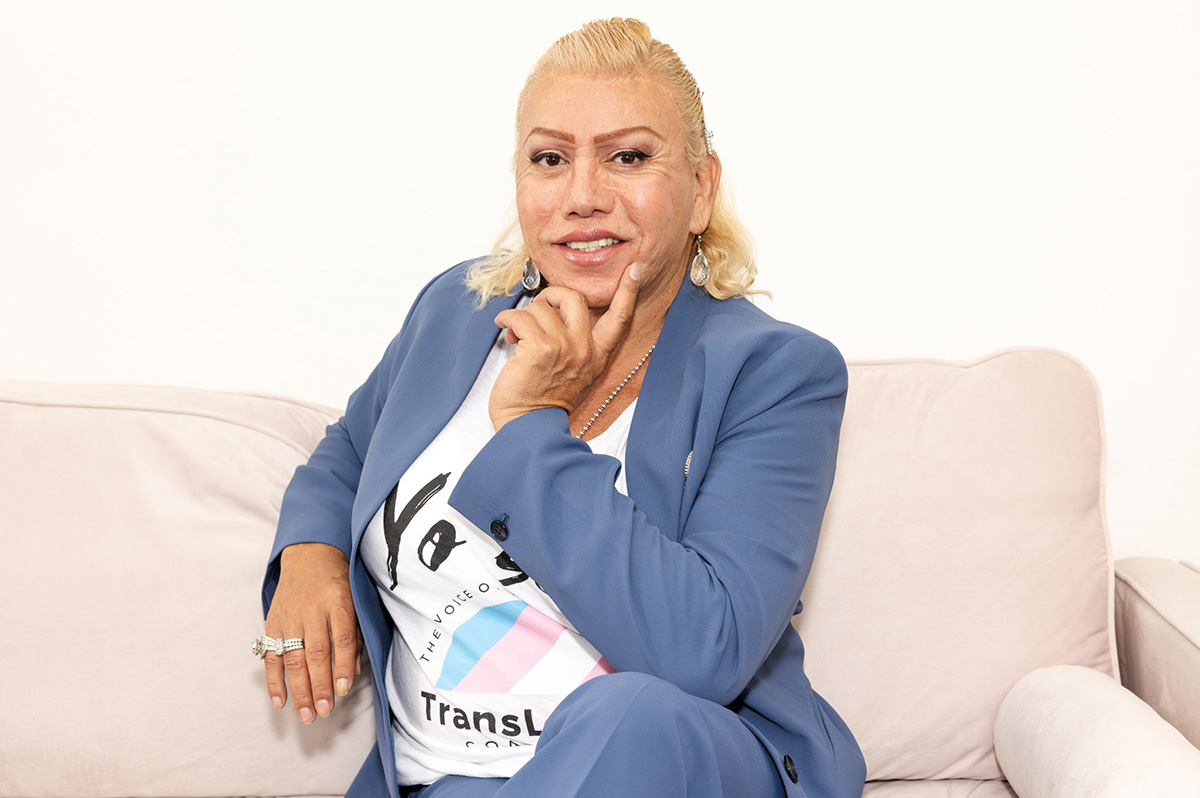
As ICE raids intensify across Southern California and anti-immigrant sentiment resurfaces in Orange County, transgender and immigrant communities are once again being targeted. These crackdowns go beyond enforcement — they’re designed to instill fear. At the same time, a coordinated right-wing smear campaign is attempting to discredit the very organizations working to keep these communities safe.
Last month, the TransLatin@ Coalition, a cornerstone in the fight for trans, queer, and immigrant rights in Los Angeles, was publicly named by members of Congress. But this was no recognition. It was a calculated attack.
“They’re calling us a radical organization,” said Bamby Salcedo, president and CEO of the TransLatin@ Coalition. “They’re spreading lies, saying we’re using government funding to abolish ICE and the police and to provide abortion access. We do believe in those things, but the funding we receive is used to serve our people.”
Now, that funding is being stripped away.
In the face of state violence, political backlash, and economic sabotage, TLC is responding the way it always has: by organizing, celebrating, and building a better world. Because when our communities are under attack, we show up — stronger, louder, and more united than ever.
Salcedo, herself a proud trans Latina immigrant, has spent decades fighting for those living at the margins. “I always say I am an intersection walking,” she said with a smile. “Our organization is made up of the people most impacted — and we are the ones leading the work.”
In Los Angeles County, roughly one-third of residents are immigrants, the majority of whom are Latino. Unsurprisingly, trans Latinas represent the largest segment within the local trans community.
Yet even within immigrant justice spaces, trans people are often sidelined.
“It’s a very hetero-centric space,” Salcedo said. “Most of the time, they don’t even consider the lives and experiences of trans and queer immigrants.”
The TransLatin@ Coalition is actively changing that. As a key member of a broad alliance of more than 100 immigrant-serving organizations across Los Angeles, including CHIRLA and the Filipino Workers Center, the TransLatin@ Coalition helped secure over $160 million in American Rescue Plan funds for immigrant housing, internet access, and legal services.
They also co-created the groundbreaking TGIE (Transgender, Gender-Nonconforming, Intersex Empowerment) initiative, which allocates $7 million in Los Angeles County’s annual budget to support trans-led service providers.
“We don’t just want symbolic policies,” said Salcedo. “We fight for resources. We analyze the budget. We make it real.”
Despite these victories, the TransLatin@ Coalition is now confronting devastating federal cuts.
“Our work has been defunded,” Salcedo said bluntly. “Multiple programs are gone. And we’re not alone — trans-led organizations across the country, especially in the South, are facing the same.”
She pointed to a broader backlash against anything associated with diversity, equity, and inclusion (DEI). “The private sector is pulling back. Philanthropy is scared. Even the same corporations that fund us during Pride are investing in our opposition the rest of the year. It’s hypocrisy.”
Rather than retreat, the TransLatin@ Coalition is calling for bold, collective action.
“Now’s the time for people to step up,” said Salcedo. “We have the strategy. We’re doing the work. But we need resources — and we need real solidarity, not just statements.”
To respond to the crisis and raise urgently needed funds, the TransLatin@ Coalition is organizing its Walk for Humanity on Saturday, Aug. 24. The event will begin at 9 a.m. in Silver Lake and march to Sunset and Western, featuring live performances, a resource fair, and a unified call for justice.
And yes — it will be joyful.
“This is a call for all people to stand in solidarity with one another,” said Salcedo. “We want to bring together 1,000 people, each raising $1,000. It’s going to be a beautiful day of community and resistance.”
In a surprise announcement, Salcedo also revealed she will debut her first single — a cumbia track inspired by the movement. “It’s about movement in both senses: our political movement, and moving our bodies,” she laughed. “We can’t let them take away our joy. Joy is how we survive.”
When asked what more local leaders can do, Salcedo didn’t hesitate. “Elected officials are public servants. That means serving all people,” she said. “We may be a small population, but we are deeply impacted — and we contribute so much to this city.”
She pointed to data from LA’s most recent homelessness count, which identified over 2,000 trans and gender-expansive people experiencing homelessness. That number exists thanks in large part to years of advocacy demanding the city count and name trans lives. “We have the data now. There’s no excuse not to invest in our people.”
She also uplifted allies like Los Angeles County Supervisor Lindsey Horvath and newly appointed City Council member Isabel Urado, the first openly LGBTQ person to hold her seat. “They’ve seen our work and are fighting to invest in it,” Salcedo said. “We’re hopeful we’ll see another $10 million in city funding. But we need the community behind us.”
At the end of our conversation, I asked Salcedo what she would say to undocumented, queer, and trans Angelenos who are feeling afraid right now.
Her answer was clear, powerful, and full of love:
“You are a divine creation. You deserve to exist in this world. Walk your path with dignity, love, and respect — for yourself and for others. You belong. You are part of me. You are part of us.”
If standing with trans immigrants, resisting federal rollbacks, and dancing in the streets sounds like your kind of solidarity, join the TransLatin@ Coalition on Aug. 24. Because when we show up together, we protect each other. And when we dance together — we win.
Watch the full interview with Salcedo:
Miscellaneous
LGBTQ cruise ship rescues 11 migrants between Cuba and Mexico
Rescue took place in Yucatán Channel on Wednesday

A cruise ship chartered by an LGBTQ travel company on Wednesday rescued 11 Cubans from a boat that was adrift between their country and Mexico.
Vacaya in a press release said the Royal Caribbean’s Brilliance of the Seas, which had left from New Orleans, discovered the migrants’ boat in the Yucatán Channel, a strait between Mexico and Cuba that connects the Gulf of Mexico (the Trump-Vance administration now refers to the body of water as the Gulf of America) and the Caribbean Sea.
A video that Vacaya provided shows the migrants’ boat before the rescue. Other videos show the rescue taking place.
MTV’s Downtown Julie Brown, who was performing on the ship, described the rescue in a video she posted to social media.
“We are in the middle of a live rescue operation right now,” she said. “The captain of the ship, while we were hauling so fast the other way, thought he saw a boat in distress. So, we looped around … and it was indeed a boat in distress.”
“Nothing speaks more to VACAYA’s values than providing comfort in a moment of need,” said Vacaya CEO Randle Roper in the press release. “I’m so happy we were able to bring these 11 refugees onboard safely and provide medical care, dry clothes, food, and, most importantly, water.”
“It’s sad that some people have to put themselves through such trauma in hopes of finding a better life, but that’s where we are today,” added Roper. “I’m so proud of our LGBT+ guests rallying to collect clothes for these fellow humans in need.”
The ship is scheduled to return to New Orleans on Saturday.
Miscellaneous
The dedicated life and tragic death of gay publisher Troy Masters
‘Always working to bring awareness to causes larger than himself’

Troy Masters was a cheerleader. When my name was called as the Los Angeles Press Club’s Print Journalist of the Year for 2020, Troy leapt out of his seat with a whoop and an almost jazz-hand enthusiasm, thrilled that the mainstream audience attending the Southern California Journalism Awards gala that October night in 2021 recognized the value of the LGBTQ community’s Los Angeles Blade.
That joy has been extinguished. On Wednesday, Dec. 11, after frantic unanswered calls from his sister Tammy late Monday and Tuesday, Troy’s longtime friend and former partner Arturo Jiminez did a wellness check at Troy’s L.A. apartment and found him dead, with his beloved dog Cody quietly alive by his side. The L.A. Coroner determined Troy Masters died by suicide. No note was recovered. He was 63.
Considered smart, charming, committed to LGBTQ people and the LGBTQ press, Troy’s inexplicable suicide shook everyone, even those with whom he sometimes clashed.
Troy’s sister and mother – to whom he was absolutely devoted – are devastated. “We are still trying to navigate our lives without our precious brother/son. I want the world to know that Troy was loved and we always tried to let him know that,” says younger sister Tammy Masters.
Tammy was 16 when she discovered Troy was gay and outed him to their mother. A “busy-body sister,” Tammy picked up the phone at their Tennessee home and heard Troy talking with his college boyfriend. She confronted him and he begged her not to tell.
“Of course, I ran and told Mom,” Tammy says, chuckling during the phone call. “But she – like all mothers – knew it. She knew it from an early age but loved him unconditionally; 1979 was a time [in the Deep South] when this just was not spoken of. But that didn’t stop Mom from being in his corner.”
Mom even marched with Troy in his first Gay Pride Parade in New York City. “Mom said to him, ‘Oh, my! All these handsome men and not one of them has given me a second look! They are too busy checking each other out!” Tammy says, bursting into laughter. “Troy and my mother had that kind of understanding that she would always be there and always have his back!
“As for me,” she continues, “I have lost the brother that I used to fight for in any given situation. And I will continue to honor his cause and lifetime commitment to the rights and freedom for the LGBTQ community!”
Tammy adds: “The outpouring of love has been comforting at this difficult time and we thank all of you!”
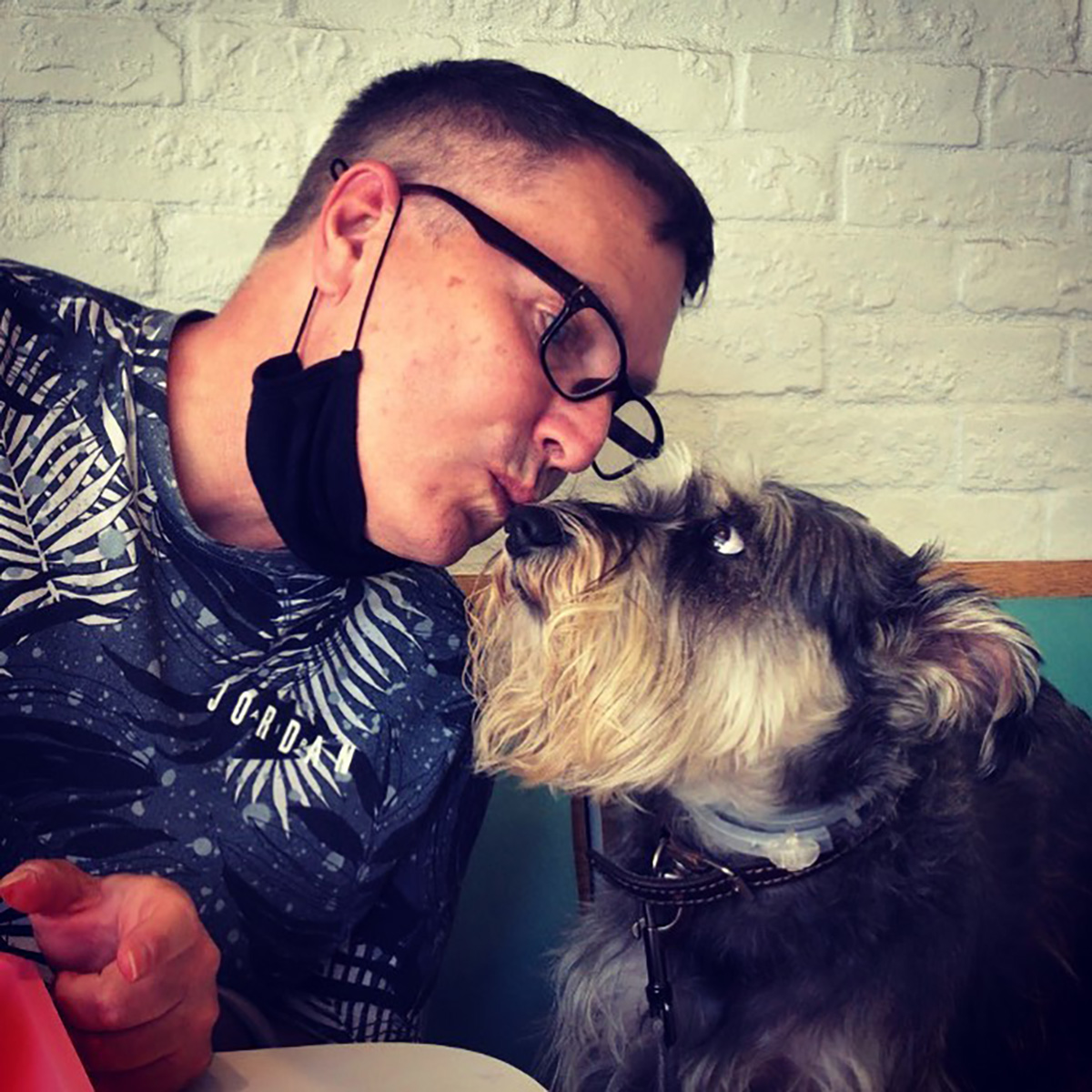
No one yet knows why Troy took his life. We may never know. But Troy and I often shared our deeply disturbing bouts with drowning depression. Waves would inexplicitly come upon us, triggered by sadness or an image or a thought we’d let get mangled in our unresolved, inescapable past trauma.
We survived because we shared our pain without judgment or shame. We may have argued – but in this, we trusted each other. We set everything else aside and respectfully, actively listened to the words and the pain within the words.
Listening, Indian philosopher Krishnamurti once said, is an act of love. And we practiced listening. We sought stories that led to laughter. That was the rope ladder out of the dark rabbit hole with its bottomless pit of bullying and endless suffering. Rung by rung, we’d talk and laugh and gripe about our beloved dogs.
I shared my 12 Step mantra when I got clean and sober: I will not drink, use or kill myself one minute at a time. A suicide survivor, I sought help and I urged him to seek help, too, since I was only a loving friend – and sometimes that’s not enough.
(If you need help, please reach out to talk with someone: call or text 988 Suicide and Crisis Lifeline. They also have services in Spanish and for the deaf.)
In 2015, Troy wrote a personal essay for Gay City News about his idyllic childhood in the 1960s with his sister in Nashville, where his stepfather was a prominent musician. The people he met “taught me a lot about having a mission in life.”
During summers, they went to Dothan, Ala., to hang out with his stepfather’s mother, Granny Alabama. But Troy learned about “adult conversation — often filled with derogatory expletives about Blacks and Jews” and felt “my safety there was fragile.”
It was a harsh revelation. “‘Troy is a queer,’ I overheard my stepfather say with energetic disgust to another family member,” Troy wrote. “Even at 13, I understood that my feelings for other boys were supposed to be secret. Now I knew terror. What my stepfather said humiliated me, sending an icy panic through my body that changed my demeanor and ruined my confidence. For the first time in my life, I felt depression and I became painfully shy. Alabama became a place, not of love, not of shelter, not of the magic of family, but of fear.”
At the public pool, “kids would scream, ‘faggot,’ ‘queer,’ ‘chicken,’ ‘homo,’ as they tried to dunk my head under the water. At one point, a big crowd joined in –– including kids I had known all my life –– and I was terrified they were trying to drown me.
“My depression became dangerous and I remember thinking of ways to hurt myself,” Troy wrote.
But Troy Masters — who left home at 17 and graduated from the University of Tennessee at Knoxville — focused on creating a life that prioritized being of service to his own intersectional LGBTQ people. He also practiced compassion and last August, Troy reached out to his dying stepfather. A 45-minute Facetime farewell turned into a lovefest of forgiveness and reconciliation.
Troy discovered his advocacy chops as an ad representative at the daring gay and lesbian activist publication Outweek from 1989 to 1991.
“We had no idea that hiring him would change someone’s life, its trajectory and create a lifelong commitment” to the LGBTQ press, says Outweek’s co-founder and former editor-in-chief Gabriel Rotello, now a TV producer. “He was great – always a pleasure to work with. He had very little drama – and there was a lot of drama at Outweek. It was a tumultuous time and I tended to hire people because of their activism,” including Michelangelo Signorile, Masha Gessen, and Sarah Pettit.
Rotello speculates that because Troy “knew what he was doing” in a difficult profession, he was determined to launch his own publication when Outweek folded. “I’ve always been very happy it happened that way for Troy,” Rotello says. “It was a cool thing.”
Troy and friends launched NYQ, renamed QW, funded by record producer and ACT UP supporter Bill Chafin. QW (QueerWeek) was the first glossy gay and lesbian magazine published in New York City featuring news, culture, and events. It lasted for 18 months until Chafin died of AIDS in 1992 at age 35.
The horrific Second Wave of AIDS was peaking in 1992 but New Yorkers had no gay news source to provide reliable information at the epicenter of the epidemic.
“When my business partner died of AIDS and I had to close shop, I was left hopeless and severely depressed while the epidemic raged around me. I was barely functioning,” Troy told VoyageLA in 2018. “But one day, a friend in Moscow, Masha Gessen, urged me to get off my back and get busy; New York’s LGBT community was suffering an urgent health care crisis, fighting for basic legal rights and against an increase in violence. That, she said, was not nothing and I needed to get back in the game.”
It took Troy about two years to launch the bi-weekly newspaper LGNY (Lesbian and Gay New York) out of his East Village apartment. The newspaper ran from 1994 to 2002 when it was re-launched as Gay City News with Paul Schindler as co-founder and Troy’s editor-in-chief for 20 years.

“We were always in total agreement that the work we were doing was important and that any story we delved into had to be done right,” Schindler wrote in Gay City News.
Though the two “sometimes famously crossed swords,” Troy’s sudden death has special meaning for Schindler. “I will always remember Troy’s sweetness and gentleness. Five days before his death, he texted me birthday wishes with the tag, ‘I hope you get a meaningful spanking today.’ That devilishness stays with me.”
Troy had “very high EI (Emotional Intelligence), Schindler says in a phone call. “He had so much insight into me. It was something he had about a lot of people – what kind of person they were; what they were really saying.”
Troy was also very mischievous. Schindler recounts a time when the two met a very important person in the newspaper business and Troy said something provocative. “I held my breath,” Schindler says. “But it worked. It was an icebreaker. He had the ability to connect quickly.”
The journalistic standard at LGNY and Gay City News was not a question of “objectivity” but fairness. “We’re pro-gay,” Schindler says, quoting Andy Humm. “Our reporting is clear advocacy yet I think we were viewed in New York as an honest broker.”
Schindler thinks Troy’s move to Los Angeles to jump-start his entrepreneurial spirit and reconnect with Arturo, who was already in L.A., was risky. “He was over 50,” Schindler says. “I was surprised and disappointed to lose a colleague – but he was always surprising.”
“In many ways, crossing the continent and starting a print newspaper venture in this digitally obsessed era was a high-wire, counter-intuitive decision,” Troy told VoyageLA. “But I have been relentlessly determined and absolutely confident that my decades of experience make me uniquely positioned to do this.”
Troy launched The Pride L.A. as part of the Mirror Media Group, which publishes the Santa Monica Mirror and other Westside community papers. But on June 12, 2016, the day of the Pulse Nightclub shooting in Orlando, Fla., Troy said he found MAGA paraphernalia in a partner’s office. He immediately plotted his exit. On March 10, 2017, Troy and the “internationally respected” Washington Blade announced the launch of the Los Angeles Blade.

In a March 23, 2017 commentary promising a commitment to journalistic excellence, Troy wrote: “We are living in a paradigm shifting moment in real time. You can feel it. Sometimes it’s overwhelming. Sometimes it’s toxic. Sometimes it’s perplexing, even terrifying. On the other hand, sometimes it’s just downright exhilarating. This moment is a profound opportunity to reexamine our roots and jumpstart our passion for full equality.”
Troy tried hard to keep that commitment, including writing a personal essay to illustrate that LGBTQ people are part of the #MeToo movement. In “Ending a Long Silence,” Troy wrote about being raped at 14 or 15 by an Amtrak employee on “The Floridian” traveling from Dothan, Ala., to Nashville.
“What I thought was innocent and flirtatious affection quickly turned sexual and into a full-fledged rape,” Troy wrote. “I panicked as he undressed me, unable to yell out and frozen by fear. I was falling into a deepening shame that was almost like a dissociation, something I found myself doing in moments of childhood stress from that moment on. Occasionally, even now.”
From the personal to the political, Troy Masters tried to inform and inspire LGBTQ people.
Richard Zaldivar, founder and executive director of The Wall Las Memorias Project, enjoyed seeing Troy at President Biden’s Pride party at the White House.
“Just recently he invited us to participate with the LA Blade and other partners to support the LGBTQ forum on Asylum Seekers and Immigrants. He cared about underserved community. He explored LGBTQ who were ignored and forgotten. He wanted to end HIV; help support people living with HIV but most of all, he fought for justice,” Zaldivar says. “I am saddened by his loss. His voice will never be forgotten. We will remember him as an unsung hero. May he rest in peace in the hands of God.”
Troy often featured Bamby Salcedo, founder, president/CEO of TransLatina Coalition, and scores of other trans folks. In 2018, Bamby and Maria Roman graced the cover of the Transgender Rock the Vote edition.
“It pains me to know that my dear, beautiful and amazing friend Troy is no longer with us … He always gave me and many people light,” Salcedo says. “I know that we are living in dark times right now and we need to understand that our ancestors and transcestors are the one who are going to walk us through these dark times… See you on the other side, my dear and beautiful sibling in the struggle, Troy Masters.”
“Troy was immensely committed to covering stories from the LGBTQ community. Following his move to Los Angeles from New York, he became dedicated to featuring news from the City of West Hollywood in the Los Angeles Blade and we worked with him for many years,” says Joshua Schare, director of Communications for the City of West Hollywood, who knew Troy for 30 years, starting in 1994 as a college intern at OUT Magazine.
“Like so many of us at the City of West Hollywood and in the region’s LGBTQ community, I will miss him and his day-to-day impact on our community.”

(Photo by Richard Settle for the City of West Hollywood)
“Troy Masters was a visionary, mentor, and advocate; however, the title I most associated with him was friend,” says West Hollywood Mayor John Erickson. “Troy was always a sense of light and working to bring awareness to issues and causes larger than himself. He was an advocate for so many and for me personally, not having him in the world makes it a little less bright. Rest in Power, Troy. We will continue to cause good trouble on your behalf.”
Erickson adjourned the WeHo City Council meeting on Monday in his memory.
Masters launched the Los Angeles Blade with his partners from the Washington Blade, Lynne Brown, Kevin Naff, and Brian Pitts, in 2017.
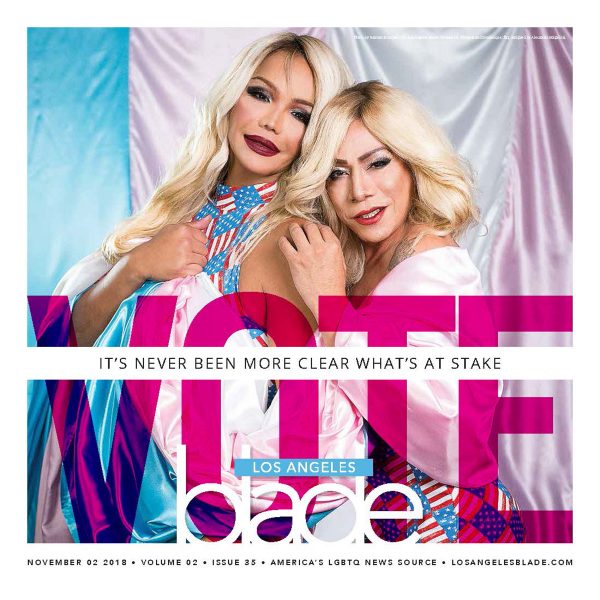
“Troy’s reputation in New York was well known and respected and we were so excited to start this new venture with him,” says Naff. “His passion and dedication to queer LA will be missed by so many. We will carry on the important work of the Los Angeles Blade — it’s part of his legacy and what he would want.”
AIDS Healthcare Foundation President Michael Weinstein, who collaborated with Troy on many projects, says he was “a champion of many things that are near and dear to our heart,” including “being in the forefront of alerting the community to the dangers of Mpox.”
“All of who he was creates a void that we all must try to fill,” Weinstein says. “His death by suicide reminds us that despite the many gains we have made, we’re not all right a lot of the time. The wounds that LGBT people have experienced throughout our lives are yet to be healed even as we face the political storm clouds ahead that will place even greater burdens on our psyches.”
May the memory and legacy of Troy Masters be a blessing.
Veteran LGBTQ journalist Karen Ocamb served as the news editor and reporter for the Los Angeles Blade.
-

 Baltimore5 days ago
Baltimore5 days ago‘Heated Rivalry’ fandom exposes LGBTQ divide in Baltimore
-

 Real Estate5 days ago
Real Estate5 days agoHome is where the heart is
-

 District of Columbia5 days ago
District of Columbia5 days agoDeon Jones speaks about D.C. Department of Corrections bias lawsuit settlement
-

 European Union5 days ago
European Union5 days agoEuropean Parliament resolution backs ‘full recognition of trans women as women’

